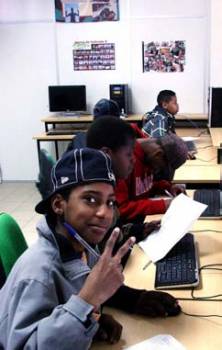UT Austin RTF Department hosts symposium: Comparing Media Trajectories in the U.S. and Portugal
Interdisciplinary research,
education and capacity building
15 Jun 2010
American and Portuguese researchers met in May to discuss the ongoing digital divide and media trajectories project.
On May 10 and May 11, 2010, the UT Austin Department of Radio-Television-Film hosted the Comparing Media Trajectories in the U.S. and Portugal Symposium. It brought together researchers from UT Austin, the Nova University of Lisbon, the University of Porto, the University of Coimbra, and the University of Texas at San Antonio to discuss the ongoing digital divide and media trajectories project. Joseph Straubhaar, Cristina Ponte, and Jose Azevedo gave summaries of the last year’s activities at their respective universities. Isabel Cunha (Coimbra), Jose Alberto (Nova), Jeremiah Spence (UT), Stuart Davis (UT), Ikram Toumi (UT), Stuart Davis (UT), Nadie Machado-Spence (UT), Jacqueline Vickery (UT), Viviana Rojas (UTSA), Esme Ramirez (UT), and Laura Dixon (UT) gave talks about their research related to the project. The research partners planned for the next round of collaboration in quantitative comparative research.
Article below posted on April 1, 2010.
A Trajectory Comparison of Digital Media Use in the USA and Portugal
 Objective 1
Objective 1
To enhance digital inclusion and integration
- By understanding the conditions and patterns of the access, use, appropriation, and associated competencies of users and non-users of digital media, with a focus on digitally excluded families, children, and young people
- By identifying how national, regional, social, and cultural contexts can affect digital inclusion.
Objective 2
To promote comparative research and advanced digital media education
- Working on a transnational and interdisciplinary approach
- Training young graduate students in ways to research digital media issues
- Promoting participatory methods of research
- Generating educational resources
In the first year, the ongoing qualitative research involves the observation of digital environments and interviews with families that involve different generations and ages (15+). The script adapted to each country includes questions about life history and media uses that focus on digital media.
In Portugal, researchers interviewed two members of 65 families for a total of 130 interviews. In Texas, researchers conducted interviews with three generations of 16 families. These families provided retrospective information from 10 years ago; and this information allows for a quasi-longitudinal comparison.
Sixty young researchers conducted the interviews. Researchers received proper training in post-graduation classes in each country. The project team is currently analyzing collected data. The team includes researchers from nine universities with approximately 15 PhD students in both countries. Six of the universities are in Portugal. Researchers disseminate scientific information via collective panels and individual papers presented at international congresses, including IAMCR, ICA, and ECREA.

 News
News

